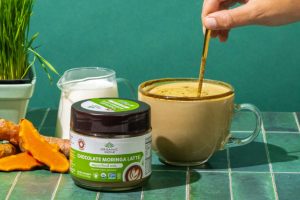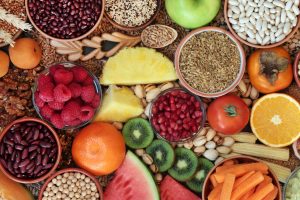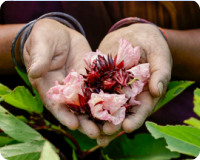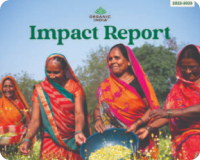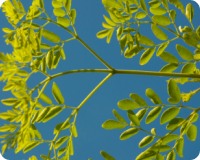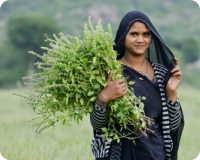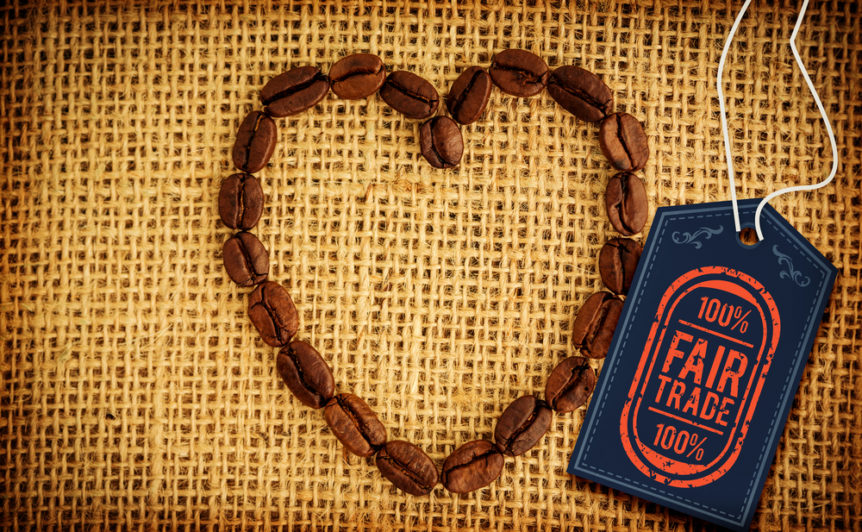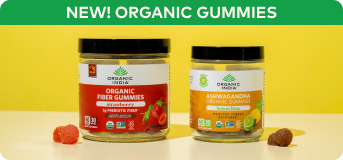

Section

Back
The World Fair Trade Organization defines Fair Trade as “a trading partnership, based on dialogue, transparency and respect, that seeks greater equity in international trade. Fair Trade organisations have a clear commitment to Fair Trade as the principal core of their mission.”
With the support of consumers, Fair Trade organizations the world over not only support their producers, but they promote awareness about fair international-trade practices, raising and campaigning for changes that create community sustainability.
Fair trade stands as a practice that departs from the “business as usual” worldview that corporations adopt that exploits any or all of their supply chains in favor of higher profits. But those dedicated to Fair Trade practices not only recognize that this way of doing business is not only untenable, but also unsustainable — in essence, biting the hands that feed them.
We now live in a world community where business and manufacturing practices have a ripple effect throughout the globe. No practice, product, consumer, grower, or byproduct exists in a vacuum. And while we have always affected one another, we do so now more than ever before. Nothing exists in a vacuum — all of life is deeply interconnected on every level.
People Before Product
Fair Trade puts people first. It’s the most dedicated and caring leaders of companies that have the vision to see beyond superficial corporate structures and understand that all business is actually personal — all the way down the line.
Every decision and action affects people who strive to be healthy and happy, and to enjoy a fulfilling life — from CEOs to fieldworkers harvesting crops. Company owners with insight understand that the world comprises people who deserve dignity, peace, and fairness.
FairTrade USA explains that “everyone wants to do what’s right — for their families, fellow global citizens, and the planet. Based on the simple idea that the products we buy and sell are connected to the livelihoods of others, fair trade is a way to make a conscious choice for a better world. A choice for Fair Trade Certified™ goods is a choice to support responsible companies, empower farmers, workers, and fishermen, and protect the environment. In other words, it’s a world-changing way of doing business.”
ORGANIC INDIA has invested in long-term relationships with their growers — small farmers and communities that have restored economic viability and personal dignity through Fair Trade practices and biodynamic agriculture. With a vision is to serve the global community as a vehicle of consciousness, this is accomplished through a sustainable, even regenerative business model that inspires, promotes, and practices respect for all beings and the planet. This view is at the heart of all fair trade business practices.
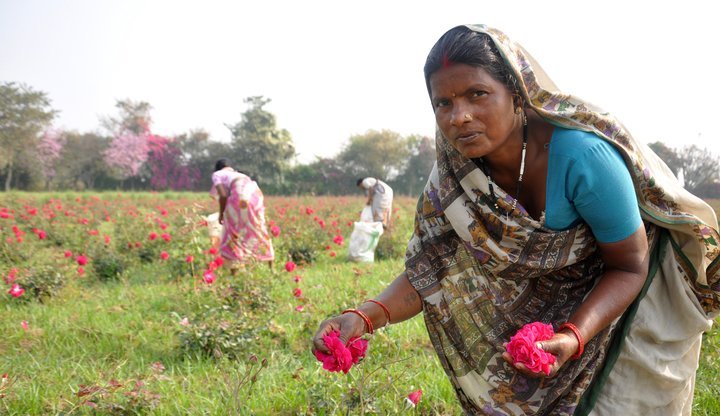
Activism Through Economics
Because of fair trade practices, consumers are now voting with their dollars in an effort to support those companies that are allied with humanity and sustainability. These individuals are reaching across the world and uplifting diverse groups of people, as well as the business owners who support them. And all they have to do is look for the Fair Trade label to participate in a highly effective form of activism.
On behalf of Nourish, a WorldLink program promoting awareness through food and community, Chef Bryant Terry, explained, “There are fair trade labeling bodies that help shoppers identify fair trade products. It’s as simple as looking for the label and supporting those options. Fair trade products are appearing in more and more stores. It happens when people make their preference clear. We need to raise our voices and say, ‘This is what we want.’”
Author Anna Lappé, an advocate for food justice and sustainability, said, “We’re beginning to see a kind of collective awakening that something is out of whack with how we think about and grow food…I feel this profound sense of being alive at this historic moment. We’re at a crossroads. On the one hand, we’re heading even further along the road of highly industrialized food. It is making us sick and leading to all kinds of health problems. On the other hand, there is this incredible emergence all around the planet. I’ve seen it from Bangladesh to Kenya to Brazil to the US —people reconnecting with where their food comes from, tapping back into our natural wisdom about what nature can provide for us. At this moment of such incredible stakes, we each have an opportunity to align our lives in the direction of health and sustainability.”
The Numbers Speak for Themselves
According to England’s Fairtrade Foundation, there are currently more than a million and a half farmers and workers in more than 70 countries participating in Fair Trade. Nearly a quarter of these people are women, and workers on Fair Trade-certified farms have invested more than a third of their premiums in housing improvements. Above and beyond the fair trade price, the “fair trade premium” is an additional sum of money that goes into a communal fund for workers and farmers to use as they see fit for social, economic, and environmental improvement.
The Fairtrade Foundation also reports that small producer organizations spent nearly 50 percent of their Fair Trade premium in services for farmers, such as agricultural tools or farmer training.
An Investment in Humanity
Fair Trade is an unusual kind of investment in the world of international business. Paul Rice, founder of Fair Trade USA, said, “There is this invisible dividend in the fair trade world that you can’t see, but you know it when you talk to a farmer.” Rice, who founded his nonprofit in 1963, added, “It’s hope, pride and dignity, because people are solving their own problems through fair trade.
Fair Trade is a valuable business model that encourages purchases from dedicated consumers. But what sets it apart from other certifications, notes Fair Trade USA, “Is that it was established as part of a joint effort of producers, consumer rights advocates, and the industry coming together to envision a better, more sustainable way of doing business. The standards are driven in large part by small producer organizations to balance higher incomes with market share.”
In addition to uplifting the quality of life for workers, fair trade supports and encourages investments in the quality of goods. As cooperatives increase their ability to support farmers’ agricultural training, and as they invest in new processing technologies and techniques, quality improves. This leads to new business opportunities, making it possible for cooperatives to make the necessary investments to become sustainable businesses. In turn, this creates the conditions necessary to sell quality products in marketplaces requiring consistency and innovation.
Fair Trade is not only fair, but it has now become a necessity. ORGANIC INDIA participates in Fair Trade by bringing the world’s first Fair Trade Certified organic herbal supplements to consumers in partnership with farmers practicing regenerative, biodynamic agriculture. The result of these methods has been sweeping economic, social, and cultural change for growers in India, and recovery from the devastation brought by attempts to industrialize agriculture in the 1960s. As one ORGANIC INDIA farmer partner said, “I have seen the return of birds I haven’t seen since I was a child.”
ORGANIC INDIA products are certified by Fairtrade America, also known as Fairtrade International outside the United States. With 30 offices worldwide, Fairtrade America is recognized as among the most distinguished and credible fair trade agencies.
Fairtrade Partnership: Divine Chocolate and Conscious Step
ORGANIC INDIA has partnered with Fairtrade Certified companies Divine Chocolate and Conscious step to celebrate October as Fair Trade Month. With common values of empowerment for women and promoting environmental recovery and regeneration it was a clear opportunity to team up to wave the Fairtrade banner.
Divine Chocolate
Divine Chocolate is the only Fairtrade chocolate company in the world that is co-owned by cocoa farmers. Kuapa Kokoo Farmers’ Co-operative in Ghana owns 44% of the company and plays a key role in decision making. With a mission to give cocoa farmers a voice in the global marketplace, Divine contributes 2% of annual sales to a Producer Support & Development Fund (PS&D) in addition to the funds from the farmer ownership model and the two streams of income from our Fairtrade certification. This extra income provides farmers with resources to thrive both socially and economically and build sustainable livelihoods with fair wages for women. The fund also supports projects like women’s educational and training programs that encourage women to achieve their goals and lead in their communities.
Conscious Step
Conscious Step makes socks for causes that matter. The company believes that they have a responsibility to create clothing that makes you feel good about what you wear. It’s more than how it looks, feels and lasts — consumers know that Conscious Step socks are not produces at the expense of people and planet. Each pair of socks is matched with a different nonprofit to create change around the world. Made with organic cotton and Fairtrade certified, one pair of socks can plant ten trees, protect oceans, or provide access to justice for two survivors of violence. Through our collective actions, we can make a difference and change the world.
